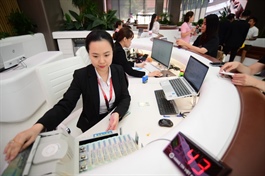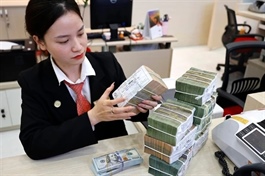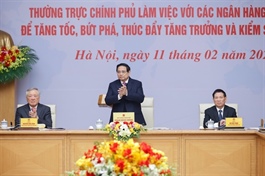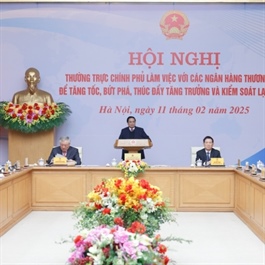Existing framework can push IFC efforts
Existing framework can push IFC efforts
Vietnam is planning to establish a regional financial centre in the central city of Danang and an international-scale one in Ho Chi Minh City. British consul general Alexandra Smith spoke with VIR’s Thanh Tung about how this can be realised.
How will major financial centres help facilitate the country’s economic development?
When I speak with British businesses and the wider business community, there is an increased sense of optimism that the centres will bring Vietnam even closer to the global financial market. The development of these centres provides the opportunity for the country’s regulations and law to align with international best practice, opening Vietnam’s market and creating the platform for the economy to grow by double-digits.
The establishment of international financial centres (IFCs) in Vietnam will help strengthen the business investment environment and legal framework in accordance with international standards, thereby fostering investor confidence and diversifying financial products, attracting more foreign investment to support Vietnam’s sustainable growth.
It will also help create new professional networks in Ho Chi Minh City and Danang, with more opportunity to develop a high-skilled workforce. At the same time, the IFCs will facilitate a network of professionals and expats from overseas to live and work in Vietnam, which will contribute to sharing best practice from across the globe with the country.
Next is to improve the quality of life. The development of such financial centres will lead to the improvement of added-value services to satisfy the needs of high-quality workers, investors,, and their families, including healthcare, education, and also entertainment.
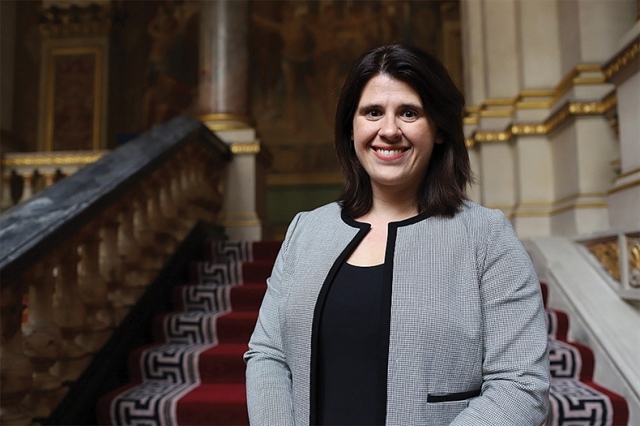
Alexandra Smith |
What strengths does Vietnam, particularly in Danang and Ho Chi Minh City, have in developing these centres?
In recent years, the UK government has been working with experts from TheCityUK, the City of London, and the British community in Vietnam to support the country’s ambition to develop such centres in Vietnam.
We believe that the growth potential of Vietnam’s professional and business services sector is immense. Factors such as Vietnam’s standing as a trading centre and role in global value chains, its geographical position and location within the Southeast Asian region, access to commodities and other agricultural products, as well as its long coastline well-suited for offshore wind projects will help form the type of IFC model for Vietnam.
The country’s trade and manufacturing sectors are well integrated into global value chains. The Vietnamese government’s adoption of various free trade agreements and the Comprehensive and Progressive Agreement for Trans Pacific Partnership has created new export opportunities.
The acceleration of digitalisation and expansion of internet penetration during COVID-19 provided opportunities to grow Vietnam’s trade in services. This can be underpinned by developing a pipeline of domestic talent from your young and tech-savvy population and boosting the mobility of international professionals.
A commitment to free and open data flow is also important. Growing its services sector will allow Vietnam to increase resilience and diversify its economy. It will also create new employment opportunities.
How can Vietnam benefit from reinforcing infrastructure and regulatory frameworks?
High-quality infrastructure and a transparent, stable regulatory framework are essential to establish a world-class financial centre.
In terms of infrastructure, high-quality infrastructure should include modern office buildings, state of the art IT ecosystems; significant data storage capacity and good transport links. Other aspects of infrastructure should also be developed to make the IFC more attractive to highly skilled domestic and international professionals and their families to base themselves in or near the IFC.
For example, attractive residential areas with access to good schools and education facilities, reliable healthcare, high-quality transport links (including efficient and speedy airport infrastructure), IT infrastructure and cultural activities are key. Visa and residency requirements for talent and the use of English are also important factors to consider.
Examples of this soft infrastructure include Abu Dhabi, which has positioned itself as an attractive destination for families, and Singapore, which appeals to younger workers.
Regarding regulatory reform, the regulatory framework should be clear, stable, consistent, and transparent. It should be aligned with international standards but should not be overly complex at the outset. Our experts have recommended a staged approach to Vietnam for regulatory reform process.
Establishing an IFC could begin with modifying and upgrading the existing regulatory and legislative framework before considering in future a shift towards the establishment of a distinct and separate jurisdiction, which can help the country develop its financial market and offerings. This will enable it to service international investors domestically, create stronger capital markets benefiting Vietnamese businesses, and deepen its integration into the international financial system.
At the same time, the IFC can also create the impetus for improving infrastructure, developing the skills of the local labour force, and developing as a hub for fintech and digital services.
How do you envision the strengthening UK-Vietnam cooperation, especially with the development of these centres?
The UK has supported Vietnam since 2022, when Vietnamese ministers visited London to learn more about its financial market. Since sharing the ambition to have an IFC in Vietnam, the UK has shared examples of best practice from around the world, to support policymakers in finding a model which works best for Vietnam’s economy. We will continue to support Vietnam as policies develop, as financial services collaboration becomes a core part of our economic cooperation.
In addition to UK government support, world-leading British financial institutions are well-placed to advise on how policy decisions may affect business practice. UK companies in the financial and professional services sector such as HSBC, Standard Chartered, Prudential, and ACCA have been in Vietnam for a long time and have contributed positively to the growth of the financial system in Vietnam.
Bilateral trade between the UK and Vietnam stood at £6.2 billion ($7.7 billion) at the end of 2024, having doubled over the last decade from £3 billion in 2014 and there are many opportunities to continue this strong growth trajectory, in which the financial sector plays a key role.
The creation of the centres also creates further opportunity for UK-Vietnam cooperation in education and infrastructure. The UK is well-placed to provide internationally recognised training and qualifications to develop the high-skilled workforce, embedding UK degrees and training into Vietnam’s leading universities. Our infrastructure, architecture and design firms can also lead the way on the design and build of the centres themselves, much as the UK did in the design of Landmark 81 in Ho Chi Minh City.
Our experts have recommended that Vietnam can continue to develop the business environment to be more competitive and attractive. Focusing on meeting international standards, such as International Financial Reporting Standards, as well as accelerating professional training in financial sectors and using English as the official language is also important.
Strategic planning for digitalisation and sustainability are crucial factors to enable the success of IFCs. The initial focus areas could be green finance, fintech, and commodity market development. Other areas can be included during later stages or introduced on a tempered basis.











